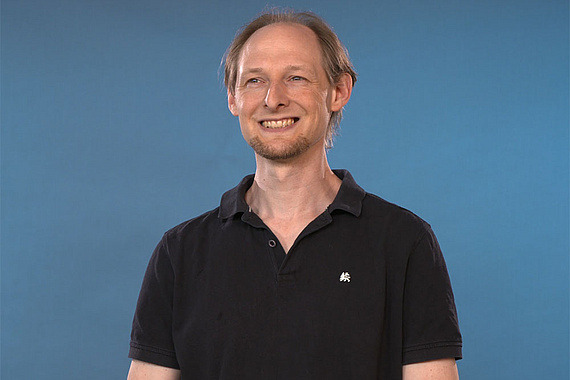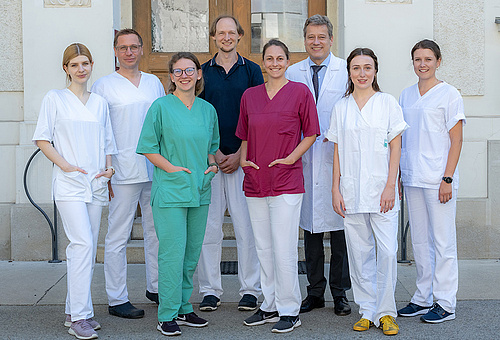-
The University
- Welcome
- Who we are
- Media & PR
- Studying
-
Research
- Profile
- Infrastructure
- Cooperations
- Services
-
Career
- Med Uni Graz as an Employer
- Educational Opportunities
- Work Environment
- Job openings
-
Diagnostics
- Patients
- Referring physicians
-
Health Topics
- Health Infrastructure

Mavacamten: International study in collaboration with Med Uni Graz
An international trial directed by the Cleveland Clinic in which Med Uni Graz was heavily involved has yielded new findings on the treatment of nonobstructive hypertrophic cardiomyopathy (HCM). Recently published in the renowned New England Journal of Medicine, the results indicate how the heart drug mavacamten impacts this complex disease and what its limits are.
A complex disease with great stress
Hypertrophic cardiomyopathy is a hereditary thickening of the heart muscle that affects up to one in 200 people. Hardly any treatment options have been available for the nonobstructive form, in which there is no narrowing of the ventricular outflow tract. "Those affected suffer frequently from shortness of breath, chest pain or palpitations and often have a higher risk of developing cardiac insufficiency or sudden cardiac death," explains Med Uni Graz cardiologist Nicolas Verheyen.
Since previous treatment options have been limited, new therapies are being sought that alleviate symptoms, improve quality of life and directly address the causes of the disease.
Practice test for mavacamten: international Phase 3 trial
Mavacamten is a myosin inhibitor that has a direct effect on the proteins responsible for the thickening and excessive contraction of heart muscle cells. For the obstructive form of HCM, mavacamten is an extremely effective drug. The international ODYSSEY-HCM Phase 3 trial has been conducted to test its effectiveness and safety for nonobstructive HCM. Phase 3 trials test drugs on hundreds of patients in order to evaluate how well they work and are tolerated.
The ODYSSEY-HCM trial examined 580 patients from 22 countries and is the largest HCM trial ever conducted worldwide. The goal was to test whether mavacamten increases functional capacity and improves quality of life. In comparison to the placebo, there did not appear to be any significant improvements with the drug. In some participants, cardiac pumping function temporarily weakened (LVEF < 50 %) and was carefully monitored.
"The trial nevertheless yields important findings for research," says Verheyen. "It shows that clinical use of myosin inhibitors for nonobstructive HCM is only possible for selected patients. This knowledge helps us better understand the disease and will help develop more targeted therapies that directly affect the heart muscle."
Important contribution of Med Uni Graz
Med Uni Graz was the coordinating center in Austria and one of the world's leading centers in patient recruitment. The first European location included in the trial was in Austria (Braunau Hospital) and the Graz HCM working group consisted of ten patients—a top-notch performance internationally.
"The commitment and performance of our HCM trial team was the main reason behind our participation in the main publication," stresses Verheyen. Andreas Zirlik, head of the Division of Cardiology, adds: "Participation in this trial shows once again that Med Uni Graz plays a visible role in international cardiovascular research."
Outlook: Research with prospects
Even if mavacamten didn't show any clear benefit for nonobstructive HCM, the trial provides valuable information on how to continue developing treatment options:
- Great medicinal need: Patients urgently need effective, specific therapy options.
- Complexity of the disease: The pathophysiology is complex and must be researched further.
- International cooperation: Only through global collaboration can rare diseases be thoroughly investigated and new therapies developed.
Thus the ODYSSEY-HCM trial provides an important foundation for future clinical trials. Med Uni Graz will continue to expand its role in researching hypertrophic cardiomyopathy. "We want to consolidate our international cooperation and also contribute to the development of new therapeutic approaches in order to facilitate effective treatments for patients with inherited cardiomyopathies," says Verheyen, looking to the future.
Profile: Nicolas Verheyen
Nicolas Verheyen is a cardiologist at the Medical University of Graz and coordinating director of the ODYSSEY-HCM trial in Austria. With his team, he conducts research on hypertrophic cardiomyopathy and inherited cardiomyopathies. Verheyen and his HCM trial team played a substantial role in patient recruitment. He is co-author of the New England Journal of Medicine publication.
Contact
Nicolas Verheyen
Division of Cardiology
Medical University of Graz
T: +43 316 385 30173



